In the run-up to the general election, Labour leader Keir Starmer has promised to “fix a broken Britain”. When it comes to tourism in the UK, he needs to be sharp about it.
According to the latest statistics from the United Nations World Tourism Organization (UNWTO), the number of British visitors in 2023 was still 5.6 per cent lower than in 2019, putting the country at the bottom of the European rankings – below France, Spain, Turkey, Greece, the Netherlands and Croatia, but ahead of Italy and Germany.
Other sources confirm the slow return to form. VisitBritain uses the ONS, which in turn uses the International Passenger Survey, which shows that there were 37.96 million inbound visits to the UK in 2023, a 7.1 per cent drop on 2019. In cash terms, they spent £31.1 billion, which, taking inflation into account, is down 10 per cent on 2019.
In addition, 1,956,526 visitor visas were issued in 2023, 40 percent more than in 2022, but 19 percent less than before the pandemic.

So why is growth so slow and why are other countries more successful?
Some of the factors underlying a tourism slump are clearly related to the cost of living crisis, and are certainly not a domestic issue. Britain is not a budget holiday option.
The World Economic Forum ranks the UK 113th out of 119 countries for price competitiveness of travel and tourism. Food and transport in particular are expensive, and this will inevitably deter people who might otherwise come.
For those who follow the news, the UK hasn’t had the best of promotional campaigns. Raw sewage on the coast, rising knife crime, chaos on the railways and even the cancellation of HS2 are hardly appealing images.
Joss Croft, CEO of UKInbound, which represents more than 450 companies that welcome, transport, guide and feed international visitors, says a major survey of summer bookings for 2024 is “pretty strong” – with 85 per cent of members saying it will be the same or better than 2023.
“However, confidence for the next 12 months has fallen significantly since April,” he adds. “All tourism depends on the three elements: resources, money and motivation. In terms of resources, the UK is requiring passports for EU travellers – this is particularly affecting the youth and student travel sector. Visa fees are high and rising, and we are introducing ETAs [electronic travel authorisations] later this year.
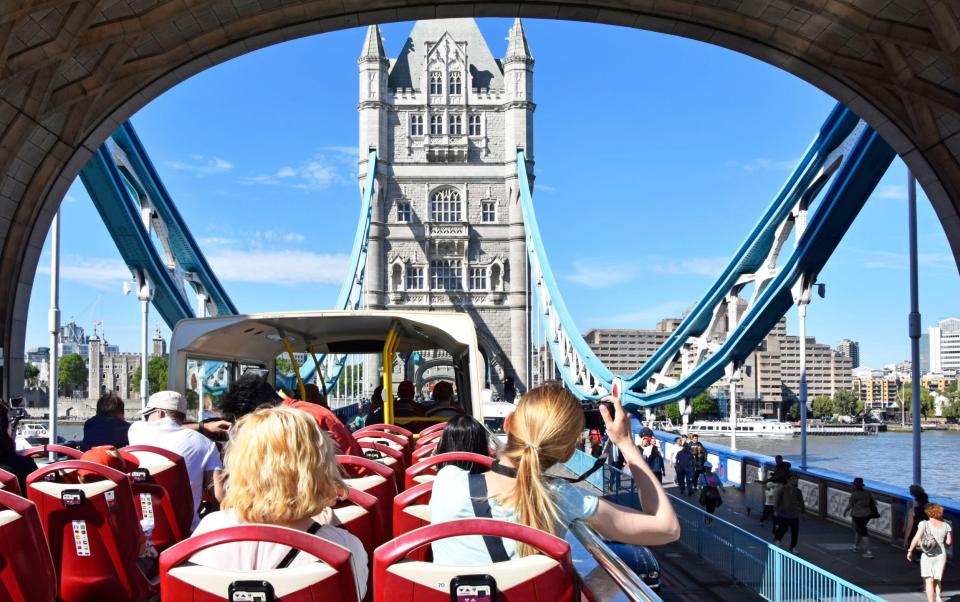

“Our reputation for welcome is poor and given that the two biggest motivators for international travel are ‘will I be welcome’ and ‘will it be value for money’, the UK is currently weak. VAT on hospitality is higher than almost anywhere else in Europe and the UK has also abolished duty-free shopping, giving competitors better value for money. Visitors are coming but they are spending less time and less money here.”
In the latest Anholt-Ipsos report on Nation Brands, the UK’s “Welcome” ranking has fallen to 19th out of 60 countries – the lowest ever for this metric.
In this context, “Welcome” refers to factors such as “Positive interaction with locals”, “Helpful hotel staff”, “Friendly service in restaurants”, “Stress-free airport experience”, “Easy travel” and “Smiling faces”.
Oxford Economics predicts that the UK’s reputation for international tourism will continue to decline, not only globally (where the Middle East is the fastest growing region) but also relative to its major Western European rivals.
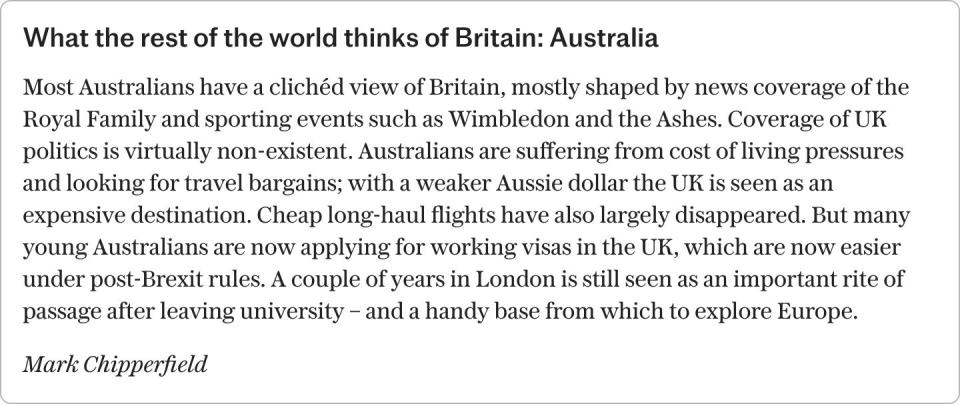

Patricia Yates, CEO of VisitBritain, acknowledges the challenges. “Tourism is a competitive global industry and visitors have a lot of choice,” she says. “Britain always scores highly for its history and heritage and contemporary culture and sport, but the perception is not so strong for its natural beauty and perceived welcome.
“The latter is a key driver in destination choice. To combat this, VisitBritain’s international GREAT campaigns show us our welcome, inspire visitors to discover more of Britain, stay longer and create that sense of urgency to come now.


“On policy matters, EU travellers used to be able to travel to the UK with just their ID card, but now they need to use a passport, which not all EU visitors hold. And we will soon see the introduction of the Electronic Travel Authorisation system.
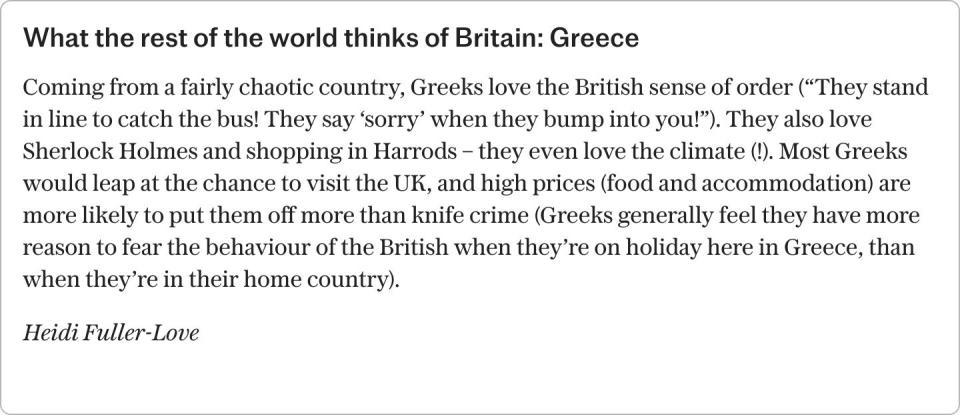

“We are working with the Home Office to ensure the rollout is well communicated. We are also working with partners in our overseas markets so they have the latest details and visitors have the clarity they need to plan and book their visits with confidence.”
There is no doubt that UK tourism is recovering, but the pace is slower than the industry had hoped. Visitor numbers are falling short of the government targets set out in the 2021 Tourism Recovery Plan, and lower than in other parts of the world, including Europe.
The government’s target was to return incoming migration to 2019 levels by the end of 2023, but all data suggests the UK will miss that target even by the end of 2024.


Richard Toomer, director of the Tourism Alliance, an umbrella organisation for more than 70 associations and bodies, says the government’s ambition was right, but policy has hampered it.
“A major one was the decision to abolish duty-free shopping for international visitors. We are now the only major European destination not to offer this service, which is a key driver for many long-haul visitors,” he says.
“Our retail, hospitality and tourism businesses are really feeling the effects. Many tourists are now shifting their visits and spending to Paris or Milan or cutting short their UK trip and saving their spending until they go to Europe. Bringing this back and extending it to EU citizens would be worth £10 billion a year and increase tax revenues by £4 billion a year.
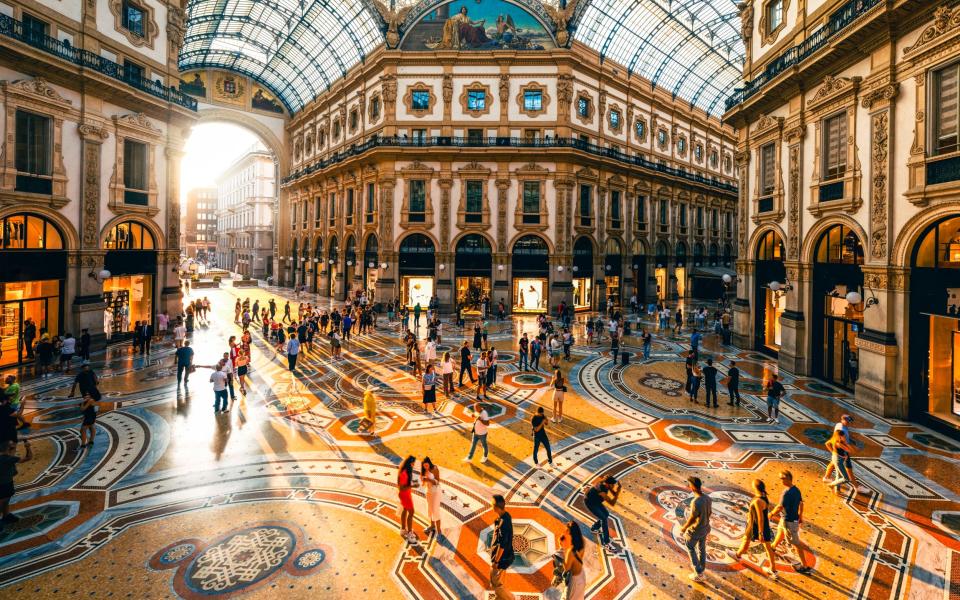

“Our visa regime is grossly uncompetitive and instead of addressing it, the previous government continued to increase visa fees. A two-year visitor visa now costs £432, a five-year visa £771. A Schengen visa costs €90 and of course allows tourists to visit multiple countries on one visa. Our application process is also cumbersome and time-consuming.”
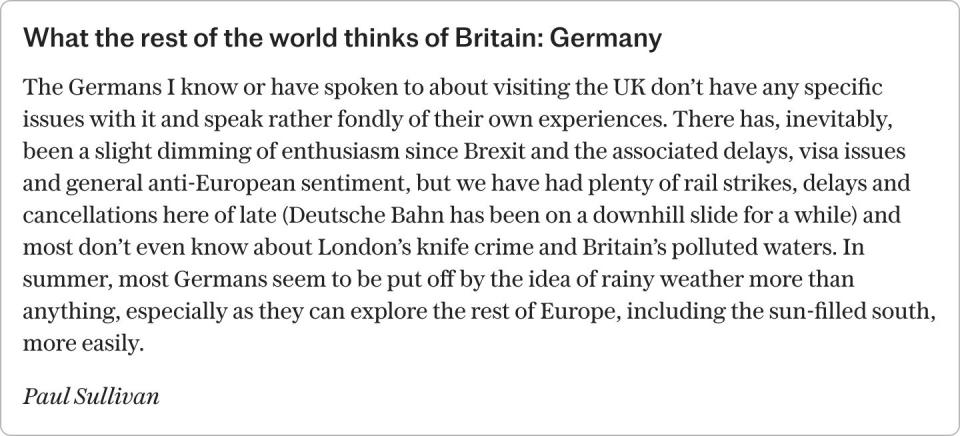

Travelling in both directions between the EU and the UK is set to become more bureaucratic and expensive. Both the UK and the EU are implementing new border regimes to improve security, but this will have consequences for travellers.
Incoming non-visa nationals will need to apply for an ETA prior to departure at a cost of £10 per person, including those only transiting through a UK airport. This will be yet another cost and barrier for people choosing to come to the UK.
Toomer says the new government has an opportunity to start again: “We call on the government to work with the sector on a new plan for sustainable tourism growth, which has ambitious goals and which backs up ambitions with good policies.
The Labour government has also pledged to restore relations with the EU. We want to take this further in an EU-UK mobility deal that does not reopen the Brexit debates but would make travel and trade between the two jurisdictions easier for both holidaymakers and business travellers.”
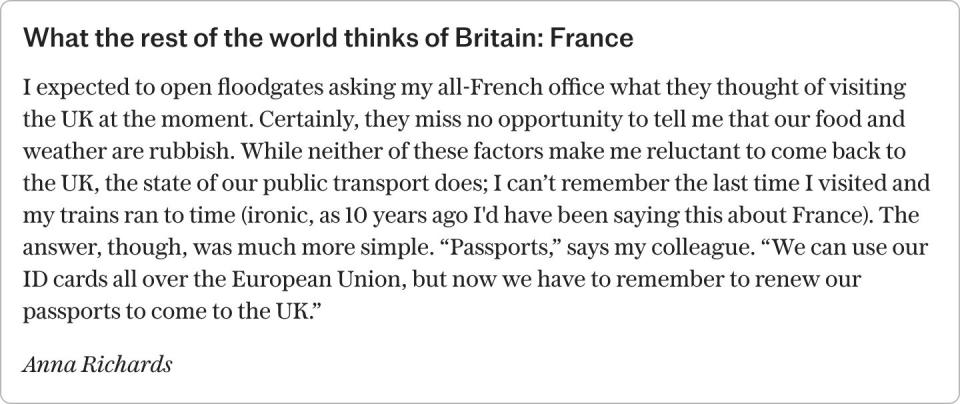

VisitBritain’s marketing budget is around £18m annually, compared with over €80m (£67m) for Ireland, despite the fact that tourism – according to the government’s own figures – brings in an impressive £21 in additional spend for every £1 invested. If just £1 of each ETA were allocated, VisitBritain could bring significant returns to the UK economy.
Perhaps the biggest challenge facing the government is its tone.
It’s all well and good to use recent history and the ‘broken Britain’ narrative to support new policies, but it might be better to keep it under wraps so that potential foreign visitors don’t have to travel the world in search of a more attractive holiday destination.